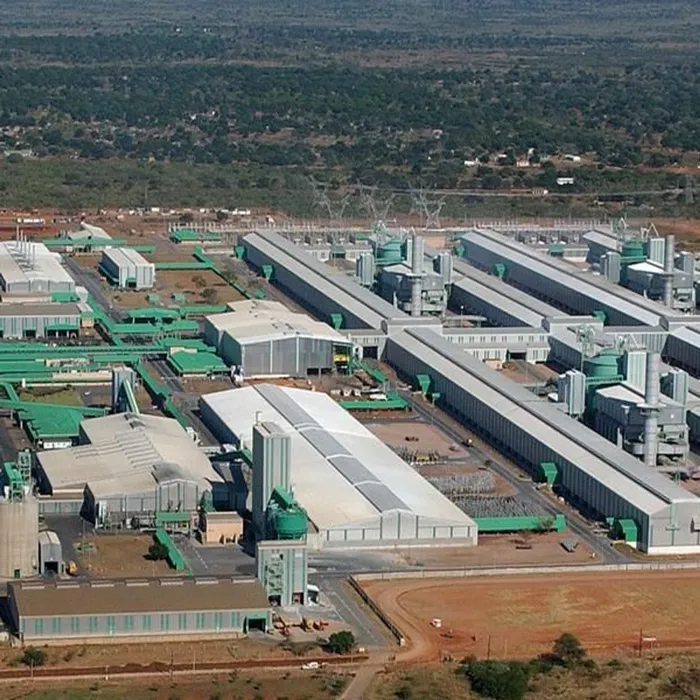South32's Mozal Aluminium closure by March 2026 a big blow for Mozambique economy
Industrial

South32 operates Mozal Aluminum in Mozambique. The smelter employed over 2500 staff last year, but is being put on care and maintenance from March next year due to an inability to reach agreement on a new electricity supply agreement.
Image: Supplied
South32 said its Mozal Aluminium facility, the biggest industrial employer in Mozambique with over 2 500 staff, will be put on care and maintenance when its electricity agreement expires at the end of March 2026.
Apart from the employees and contractors that were employed at Mozal in 2024, an estimated additional 21 000 jobs had been created through multiplier impacts on the economy, the mining group said. South32’s share price plunged 5.83% to R33.41 on the JSE early Thursday morning.
South32 said in a notice on Thursday that it had continued to engage with the Mozambique government, Hidroeléctrica de Cahora Bassa (HCB), and Eskom on securing additional electricity, as it has been trying to secure an agreement for over six years.
South32 also operates the Hillside smelter in Richards Bay, with both smelters supplied with alumina that is mostly mined and imported from Australia. The impact stretches beyond the direct workforce at Mozal, as the facility supports not only smelting operations but also downstream industries and infrastructure development.
Anchor Capital analyst Robbie Proctor said the smelter is very important to the Mozambique economy, as it contributed 4% of Mozambique’s GDP, and the aluminium exports made up 15% of that country’s total goods exports.
“These engagements do not provide confidence that Mozal will secure sufficient and affordable electricity beyond March 2026. As a result, we will limit investment in Mozal, stopping pot relining and standing down associated contractors starting this month,” the global mining group said. South32 would incur an estimated R6.53 billion impairment as a result of the closure.
Historically, most of the electricity for Mozal has been generated in Mozambique by a hydroelectric power generator, Hidroeléctrica de Cahora Bassa (HCB). HCB is owned by the Mozambique government.
Under the agreement, electricity from Eskom is supplied to Mozal when HCB is unable to meet all of Mozal’s electricity requirements. HCB recently indicated that drought conditions might impact its capacity to deliver sufficient hydroelectric power to Mozal, which had increased the uncertainty regarding future electricity supply to Mozal.
“Without access to sufficient and affordable electricity, we expect that Mozal will be placed on care and maintenance at the end of the current agreement,” it said.
Proctor said the primary stumbling block has been the electricity tariff. He said another complicating factor behind the talks between the parties was likely to the current agreements also in place between Eskom and Mozambique’s energy company, as around two-thirds of the electricity from Cahora Bassa is exported to South Africa.
He said the Mozambique government wants Mozal to be supplied directly by the Mozambican energy company, rather than power being sold to Eskom and then being bought back by Mozambique’s transmission company. “So it’s more complicated than just renewing the existing agreement with Eskom, as was the case with the Hillside smelter,” said Proctor.
Mozal's 2026 financial year production was expected to be about 240kt (South32 share), reflecting fewer pots in operation as pot relining stops and operations continue only to March 2026.
Mozal produced 318 000 tons of aluminium in 2024. Hillside, which is Eskom’s biggest industrial customer, produced 718 000 tons of aluminium last year.
A carrying value assessment of Mozal had been completed, and as a result, South32 would recognise an impairment of $372m for Mozal with its financial results for the 2025 financial year.
This included $339m of property, plant, and equipment, $7m of intangible assets, and $26m of raw materials and consumables. The impairment reduces Mozal's carrying value to $68m, the group said.
Hillside’s 10-year negotiated electricity price agreement with Eskom is set to run until 2031.
Meanwhile, the President of Mozambique on Wednesday said the country would achieve universal access to energy by 2030, with the capitalisation of the Cahora Bassa Hydroelectric plant and also using alternative energies.
President Daniel Chapo was quoted by the Club of Mozambique website as saying at the opening of the general assembly of the Africa50: “Mozambique is committed to universal access to energy by 2030, with an integrated strategy that combines the development of the energy market, industrialisation, and attracting investment, capitalising on Cahora Bassa and Mphanda Nkuwa (a dam project) as drivers of economic transformation and the creation of internal value.”
The Africa50 is a continental mechanism that finances the construction of infrastructure.
Andrew Bahlamann , CE Corporate & Advisory, Deal Leaders Internationa, said Mozal's reliance on hydropower from HCB has left it exposed to climatic risks such as drought, and the lack of alternative power sources at the required scale has left the smelter with little leverage in negotiations.
"Ultimately, the Mozal case is a sobering reminder of the importance of competitive, reliable electricity in sustaining heavy industry. It also raises difficult questions for policymakers in Africa: Can African countries build the kind of energy infrastructure and governance systems necessary to support large-scale manufacturing? And how can they ensure that vital investments are not lost due to regulatory gridlock and supply uncertainty?"
visit:www.businessreport.co.za